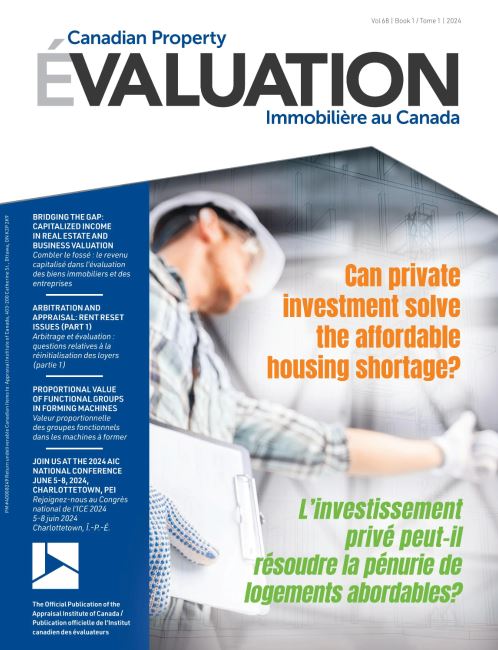Connection: An antidote to adversity
Canadian Property Valuation Magazine
Search the Library Online
BY ANDY PHAM, P. APP., AACI
I came to Canada in 1980, still too young to go to school. My parents and I had just completed our harrowing escape from Vietnam at a time when the people of South Vietnam were trying to leave the country after the Fall of Saigon on April 30, 1975. My family secretly left Saigon for the Mekong Delta to take a small fishing boat to flee the country by sea. After three days on the open water, and with much good luck, we landed on an island in Malaysia where we settled briefly in a refugee camp on Pulao Bidong.
Growing up in Canada from a young age, I did not face many issues with language, although I was in an English Second Language program for a couple of early elementary school years. This was mainly because we did not leave behind the language of our former homeland and continued to speak exclusively Vietnamese at home.
In East Vancouver, as a Vietnamese kid growing up in a school with a large proportion of Asian students, it was not out of place for the academic achievers to be Asian. Entering Simon Fraser University, it was more of the same. Often, the best and brightest were Asian. In school, I did not identify with the idea of being from a marginalized community because, simply put, Asians were the dominant group.
Entering the working world, I began my career in downtown Vancouver. Unlike the experiences of my youth, I saw that most of the professionals working downtown were not Asian. Concerningly for me, I also saw that most recruiters and HR professionals – those with the power to hire me – were anything but Asian.
As I worked to find my professional foothold in the world, I found that some people were genuinely concerned with my best interests and graciously shared with me their hard-earned knowledge, with the aim of helping me develop as a professional. For that, I am very grateful. However, others saw me as mainly a means of production. I was smart, quick, and cheap. When it came time to ask for more in exchange for my time, energy, and accumulated knowledge, I was not met with an open discussion, a planning process, or indeed with any means to advance my career. Instead, I got a simple and disheartening response: no.
That moment taught me that how I saw myself was not how I was seen by some people in my company. And because I was different from my colleagues, my employer thought it permissible to dismiss my asks as unwarranted and unwelcome. I wonder: if the asks had been made by someone who more closely resembled upper manager – someone white – whether they would have garnered a more positive response.
These are the questions that people from marginalized communities are left to face. And as for the answers, the odds are not in our favour. According to a report published by PayScale in 2018, people of colour are significantly less likely than white men to receive a raise when they ask for one. The study found that women of colour were 19% less likely and men of colour were 25% less likely to receive a raise as compared to a white man.
Could it be that I was facing barriers posed by racism and prejudice? While I waited for wholesale system change, I saw it as possible within my own life to break down barriers on an individual level; that is, one person at a time. If my environment was hurting me, I would change my environment.
In the past, people have often asked me: how did I get to be where I am today? And I have often told them that I made it my focus to meet people and make authentic connections. I indiscriminately met and invited people out for coffee and lunch. If a person was receptive to speaking with me, shaking my hand, exchanging business cards, and agreeing to connect sometime in the future, that was enough for me to follow up.
The following is a story which I have told many times about how a single moment changed my entire career path. I was a fee appraiser at the time and attending the Vancouver Real Estate Forum. I entered the room late to watch a panel discussion and greeted the person who was immediately closest to me at the table. We exchanged names quickly, lamented that we did not have time to chat, traded business cards, then went our separate ways for the day.
Over the next few weeks, work continued as it does, and I found myself applying for a new opportunity in real estate. At the same time, I had been in contact with the person I had met at the forum, and we had scheduled a lunch. During lunch, we talked about being from Asian backgrounds, working hard to make our way through the real estate industry, and being met with similar challenges of not being fully accepted. I also found out that my new friend had just left a position at the very company where I had just applied. Small world! We ended our lunch, agreed to stay in touch, and went our separate ways.
About a week later, I got a call from my new friend, asking how the job application went. I replied that the company HR person had told me that I did not have suitable qualifications and so I would not be interviewed. My friend told me that the role was the first of two available positions at the company. The second had come up due to an unexpected departure and my friend asked if I was interested. Of course I was. My friend offered to deliver my resumé to the office directly and before the day was up, my resumé was in his hands. Before the end of the week, I heard back from the company and was told to expect a call from HR. Believe it or not, the same HR contact person who told me earlier that I did not have suitable qualifications called me to set up a phone screening.
That company was Sun Life Financial, and the rest is history.
To this day, I remind myself that everyone deserves your time, if only for a moment. Extend your hand, say “hi,” offer to connect if it is beneficial for both parties. There is something that you can learn and gain from every interaction you have with someone else. They might even change your life. How was I to know that the person I chanced to meet in less than five minutes at the Vancouver Real Estate Forum happened to work at the very company where I had just applied? If I had not made that brief contact and followed up with a lunch meeting to connect through conversation, I could not have hoped to learn about the second role, which I eventually filled.
Professionals of colour, in appraisal or elsewhere, would do well to remember that repeatedly showing kindness, understanding, and a spirit of friendship on a one-on-one basis can be a good way to show people that yes, you are worth knowing, staying in touch with, and hiring.
Over the years, I have tried to build my knowledge, not through market reports or industry summaries, but by taking time out of my day to talk to whoever would talk to me. It is a cliché, but it is true that time is the most precious commodity. So, when someone agrees to spend their precious time with you, be open, honest, and sincere. Impressions go a long way, and you never know where a strong, positive impression may lead.
When you make time to connect with people in – and even beyond – your industry, it reaffirms who you are and what you value. People remember you, should an opportunity come up. You create a personal brand that could work wonders for you, even when you are not in the room. You create a positive network willing to bring up your name in conservation in their circles of influence, opening you up to opportunities which might have otherwise been several degrees of connection away from you.
So, in conclusion, I say be open to others. Be open to saying “yes” and seeing where it will lead you. Because, when the world faces people of colour with harsh words and unfair treatment, people of colour respond with resilience and excellence.
What will that look like for you?





